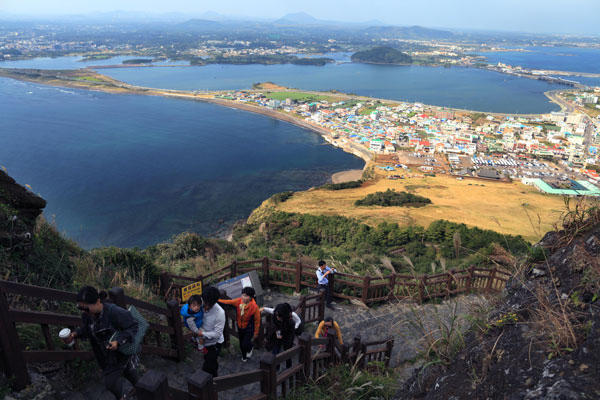Toward a new visa vista in South Korea
The new services will spare group travelers from visiting the ROK's embassy in China, ROK media report. Tourists will be able to apply through online travel agencies.
"We'll adjust our visa services immediately once we receive the official notice from the ROK's embassy in China," says Dai from Ctrip.
The company arranged trips for more than 300,000 Chinese last year.
Tourists can make reservations using the company's app or website once the policy takes effect, Dai explains.
She believes the measures will generate more incentives for Chinese to visit the ROK, reinforcing the country's recent popularity as outbound Chinese tourists' No 1 destination.
More than 6.1 million Chinese tourists visited the ROK in 2014, up 41.6 percent over the previous year, the ROK's tourism authority reports. Tourism flow between the two countries reached 10 million during the period.
The new rules will increase the ROK's efficiency in processing the surge of Chinese applications and enable more visits, the ministry says.
Last year, more than 3.31 million visas were issued to Chinese residents, a 50 percent increase from 2013, the ROK's embassy in China reports.
Visa policy holds great sway over inbound and outbound travel, points out Jiang Yiyi, director of the China Tourism Academy's International Tourism Development Institute.
About 2.8 million Chinese tourists-nearly half who visit the ROK-visit Jeju Island, which has offered visa exemptions for Chinese since 2008, Jiang says.
In the first two months of 2015, more than 300,000 visited Jeju, says Li Haishun, head of the Jeju tourism body's Beijing office.
About half of Chinese tourists to the ROK are individual travelers. The trend seems likely to gain momentum.
There's shrinking interest in traditional group sightseeing tours, publicity manager of the ROK tourism authority's Beijing office Zhu Linlin says.
"More people from Beijing, Shanghai and Guangzhou, especially those born in the 1980s and 1990s, are choosing individual travel," Zhu says.
The ROK is adapting, she says.
Chinese born in the 1980s account for about 60 percent of visitors. Those born in the 1990s are a "new force", comprising more than 20 percent, a Ctrip study finds.
About 70 percent are women.















